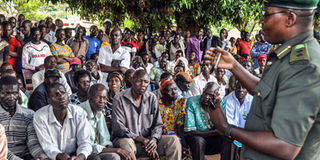Wildlife attacks on locals worries UWA

Dialogue. UWA director for operations Charles Tumwesigye addresses residents of Kamdini Sub-county who turned out for a meeting at Nora Trading Centre on Tuesday. PHOTO BY BY TOBBIAS JOLLY OWINY.
Oyam. The growing incidents of wildlife attacks of residents in the country is worrying Uganda Wildlife Authority (UWA).
Mr Charles Tumwesigye, the UWA director of operations, said during a community meeting with residents of Kamdini Sub-county on Tuesday that the animal raids and killing of people outside gazetted wildlife facilities across the country is disastrous.
Mr Tumwesigye observed that cases of human deaths arising from stray elephant attacks had become rampant yet they cannot do much as UWA because they are overwhelmed.
The meeting was organised by UWA.
“This problem of human-wildlife conflict is now a national disaster. Kamdini area is just one part. Your neighbours in Apala B up to Pakwach bridge, all that area is a hot spot for human-wildlife conflict with elephants, buffaloes and lions,” he said.
He added: “As UWA, we don’t like to see the people suffering, we really feel the pain you go through, but as we talk, even here in Kafu, we have lost about six people to crocodiles. In Lake Victoria, several people have been eaten by crocodiles and it is a very big problem.”
During the meeting, locals tasked UWA to compensate them for the loss of more than 17 people killed by elephants in the sub-county in the past one year.
They said the most affected were residents of Kamdini, Aber and Loro sub-counties in Oyam District by wildlife from the neighbouring Murchison National Park.
Mr Tumwesigye said UWA does not have enough manpower, resources and equipment to enhance its operations in order to avert human-wildlife conflict.
He said currently, there is a boom in elephant population across national parks of Uganda, although the number of rangers and scouts deployed by the authority has remained low to handle the big number.
“Recently, President Museveni passed out 490 rangers and Murchison Falls Park got only 70 of them,” Mr Tumwesigye added.
He revealed that UWA manages 11 per cent of Uganda’s total area, with only 2,000 staff (1,700 of which are rangers). The number cannot adequately deploy to smoothly run operations across all the 40 protected facilities run by UWA.
He, however, said UWA has embarked on a process of installing a 10km-stretch of electric fence around Queen Elizabeth National Park, and will soon install another 5km-electric fence in Oyam and Nwoya along their borderlines with Murchison Falls National Park.
“The lives of people are very important to us more than the animals, we plan to do this very soon in order to holistically address this problem because it is affecting the livelihoods of so many people,” Mr Wilson Kagoro, the UWA community conservation warden for Karuma, said.
Mr Kagoro noted that UWA staff at Wangkwar gate in Nwoya District are testing drones, a new technology to repel elephants once they stray into the community.



